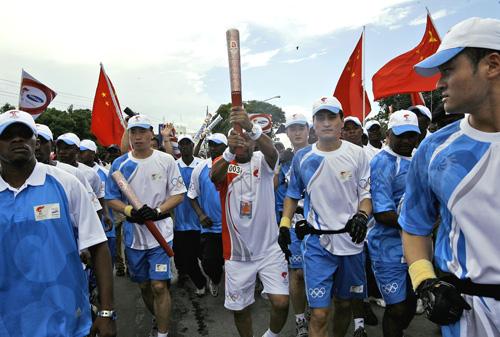National security adviser: ‘quiet diplomacy’ preferable to boycott

Tanzanian riot police escort the Olympic torch in Dar es Salaam, Tanzania, on Sunday. President Bush has advocated diplomacy over boycotting the games. Jerome Delay, The Associated Press
April 14, 2008
WASHINGTON – It would be a “cop-out” for countries to skip the opening ceremonies at the Beijing Olympics as a way of protesting China’s crackdown in Tibet, President Bush’s national security adviser said Sunday.
The kind of “quiet diplomacy” that the U.S. is practicing is a better way to send a message to China’s leaders rather than “frontal confrontation,” Stephen Hadley said.
President Bush has given no indication he will skip the event. “I don’t view the Olympics as a political event,” Bush said this past week. “I view it as a sporting event.” The White House has not yet said whether he will attend the opening ceremony on Aug. 8.
“We haven’t worked out the details of his schedule at this point in time, but from his vantage point, if you listen to what he said, he has no reason not to go,” Hadley said in broadcast interviews Sunday. “Because what he has said is we need to be using diplomacy.”
Calling a boycott issue “a bit of a red herring,” Hadley added: “I think, unfortunately, a lot of countries say, ‘Well, if we say that we are not going to the opening ceremonies, we’ve checked the box on Tibet.’ That’s a cop-out.
Get The Daily Illini in your inbox!
“If other countries are concerned about Tibet, they ought to do what we are doing through quiet diplomacy, send the message clearly to the Chinese that this is an opportunity with the whole world watching, to show that they take into account and are determined to treat their citizens with dignity and respect. They would put pressure on the Chinese authorities quietly to meet with representatives of the Dalai Lama and use this as an opportunity to help resolve that situation,” he said.
Critics of China say that were Bush to avoid the opening ceremony, it would send a powerful signal of international anger over China’s violent response to demonstrating Buddhist monks in Tibet.
“The whole issue of opening ceremonies is a nonissue,” Hadley said. “I think it is a way of dodging what really needs to happen if you’re concerned about” Tibet.
British Prime Minister Gordon Brown and German Chancellor Angela Merkel will not attend the opening ceremonies. Brown’s office says he will attend the closing ceremony. Merkel said the opening event never was on her schedule.
Bush is going the Olympics to show support for the American team and all the participating athletes, Hadley said. At the same time, he is relying on “his own personal diplomacy” in dealings directly with Chinese officials.
In a telephone call March 26, Bush pushed China’s president, Hu Jintao, about the violence in Tibet, a necessity for restraint and a need for China to consult with representatives of the Dalai Lama, Tibet’s spiritual leaders, the White House said.
“We have a lot of leverage on China. We are using it in a constructive, diplomatic way. And it is a lot greater leverage than just the issue of whether he goes to an opening ceremony or not,” Hadley said. “The whole international community has leverage. They ought to be using it now, not letting themselves off the hook by simply saying, ‘Well, we won’t go to the opening ceremonies.'”






